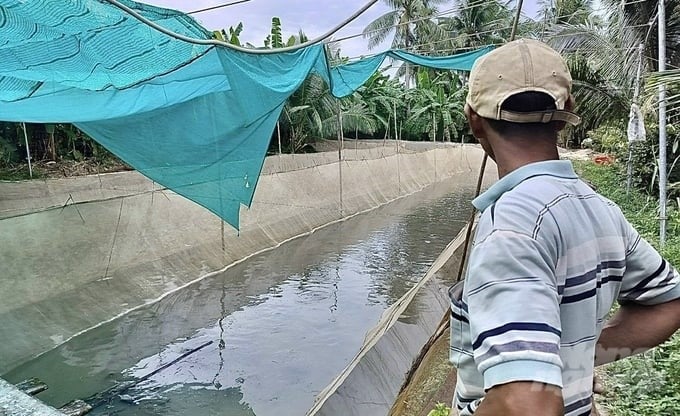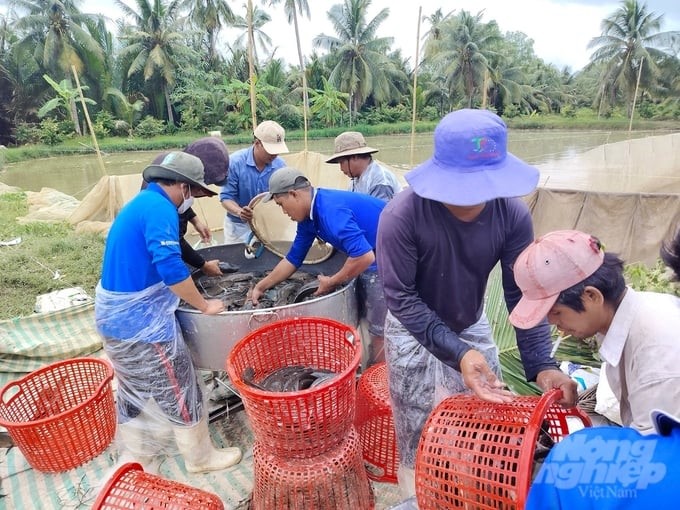November 26, 2025 | 06:35 GMT +7
November 26, 2025 | 06:35 GMT +7
Hotline: 0913.378.918
November 26, 2025 | 06:35 GMT +7
Hotline: 0913.378.918

For each farming pond with an area of 1,000 m2, snakehead fish farmers have to spend about VND 40 million to buy medicine to treat diseases in each farming crop (there are 2 crops/year). Photo: Ho Thao.
Mr. Nguyen Van Huyen, a veteran farmer in Phuong Thanh commune, Cang Long district, said that the purchasing price of snakehead fish is currently increasing sharply, ranging from VND 45,000 to VND 50,000/kg. With this price level, farmers can earn profits of up to approximately VND 50 million/1,000 m2.
According to Mr. Huyen, it is not simple to raise snakehead fish because this fish often suffers from diseases such as bacillary necrosis disease, swollen head syndrome, red tail syndrome, and diseases related to the digestive tract. On average, for each snakehead fish farming pond with an area of 1,000 m2, farmers have to spend about VND 40 million to buy medicine to treat diseases in each farming crop (there are 2 crops/year).
"When fish get mild diseases, we often use cheap medicines. If the disease situation becomes serious, it is mandatory to use antibiotics. It is a normal thing that many people have had to sell their houses and land to pay for fish medicine," said Mr. Huyen.
In Tra Cu, the district with the largest snakehead fish farming area in Tra Vinh province (about 450 hectares), farmers have transformed from intensive farming models to applying pond systems following technical procedures to reduce the risk of disease outbreaks and optimize productivity.
As in the case of Mr. Thach So Phol in Dai An commune, Tra Cu district, snakehead fish are raised at a low density, about 20,000–25,000 heads/1,000 m2 of water surface area. With the above-mentioned method, he limited water pollution and increased the weight of the fish. After only four months of being raised, the snakehead fish reached a weight of 0.7–1 kg/head and were less susceptible to common diseases.
Mr. So Phol shared that even though the price of snakehead fish is currently high, the risk of oversupply can still occur because farmers massively expand their area when fish prices increase. To ensure a sustainable market, local authorities need to consider expanding export markets. However, it is difficult to meet the criteria for ensuring food safety and hygiene as well as biosecurity because snakehead fish are now raised at high density and farmers use antibiotics excessively.
Therefore, Mr. Phol also wishes the agriculture sector to have solutions to limit the uncontrolled expansion of pond areas as well as the widespread use of antibiotics nowadays.

According to experts, in order for the snakehead fish industry to develop sustainably, it is necessary to rearrange the farming process, especially in the use of banned antibiotics, to ensure food safety and hygiene. Photo: Ho Thao.
In recent times, the Tra Vinh Department of Agriculture and Rural Development has focused on recommending farmers raise snakehead fish according to the method of stocking seeds in rotation and low density to limit diseases.
However, according to Mr. Diep Thanh Toan, Director of the Center for Research and Aquaculture at Tra Vinh University, with the farmers’ current farming density and a pond with an area of 1,000 m2, about 300 tons of snakehead fish harvested is equivalent to about 300 tons of waste directly discharged into the pond, including leftovers and fish excrement, etc. This is the reason why more and more diseases appear in snakehead fish, leading to fish farmers being forced to use antibiotics to control diseases.
In order for the snakehead fish farming profession to be sustainable, the agriculture sector needs to rearrange the process of raising fish safely, especially controlling the use of banned antibiotics that are harmful to the environment and livestock.
Currently, the Tra Vinh Department of Fisheries is implementing many solutions to protect and improve the snakehead fish farming environment, including wastewater treatment before discharging into the environment by biological methods. Besides, the treatment of waste from the farming process to make organic fertilizer for crops is also implemented.
Mr. Nguyen Van Quoc, Deputy Director of the Tra Vinh Department of Fisheries, recommends that every year, farmers comply with the farming crop schedule and apply farming technical procedures guided by specialized agencies. Farmers should stock at appropriate densities, not use banned antibiotics during the farming process, and arrange ponds to store wastewater along with ponds to store organic waste. Farmers also need to comply with wastewater treatment regulations to create commercial snakehead fish products with biosafety.
Tra Vinh has the largest snakehead fish farming area in the Mekong Delta, with about 1,500 farming households on a total area of 450 hectares. By the end of 2022, Tra Vinh had harvested an estimated output of snakehead fish of approximately 52,000 tons.
Translated by Huyen Vu Thu

(VAN) The Ministry of Agriculture and Environment must spearhead the construction of green governance, spanning decision-making processes and investment standards to policy evaluation mechanisms.

(VAN) The Agriculture and Environment sector of Khanh Hoa has achieved numerous milestones over the past 80 years, contributing significantly to the goal of establishing the province as a centrally governed city by 2030.

(VAN) Viet Nam is entering the pivotal period of 2025-2030, moving toward the formulation of the Remote Sensing Law, which will establish a legal foundation for the development of national digital data.

(VAN) The agricultural sector is finalizing the strategic framework for emission reduction, setting the goal of sharply cutting methane and 403.7 million tons of CO2 equivalent and moving toward Net Zero by 2050.
/2025/11/22/2236-1-153832_483.jpg)
(VAN) The National Marine Spatial Planning is opening up opportunities for sustainable blue sea development across 21 coastal localities.

(VAN) Viet Nam’s forestry sector is undergoing a comprehensive transformation, strengthening management, protection, and development efforts to maintain ecological security and drive green, sustainable growth.

(VAN) Viet Nam is accelerating efforts to digitize reservoir operations, from real-time data to hydraulic modelling.